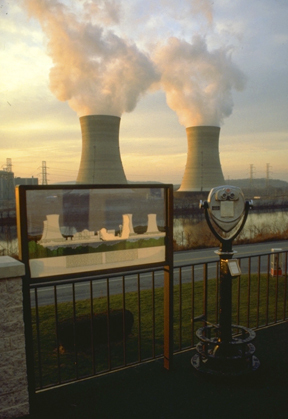
I remember March 28, 1979 and its lessons vividly. 30 years after the near melt down of a fail-safe nuclear power plant, there are lessons for economists and regulators at the Federal Trade Commission (FTC).
In January 1979 my wife and I had moved from Chicago to Ithaca, NY. Ithaca is a gingerbread town on the banks and hills nestled up against fjord-like Cayuga Lake. It is surrounded by farms, forests, parks, and waterfalls.
On March 28 we awakened to a late season snowfall. My wife had gone to work at Cornell University, and, as I gathered my thoughts for a morning at the typewriter, I stood at the picture window of our first home with a cup of coffee and watched the colorful birds compete for seed on our feeder. Behind the house, across the creek, a herd of about 20 deer grazed in the 12,000 acre state park we had for a back yard. I felt as if I was inside a snow globe.

And then the radio told me that in the wee hours, only 150 miles south, a nuclear power plant named Three Mile Island (TMI) near Harrisburg, PA, was having problems.
My wife and I had just seen the new movie, China Syndrome, starring Jane Fonda and Jack Lemmon. Fonda played a TV reporter doing a feature on nuclear power. While filming from a glass enclosed gallery overlooking the control room of a nuclear power plant near LA, the ground shudders and she and her cameraman notice the supervisor, Lemmon, and other workers look terrified. Apparently water has been accidentally draining from the reactor core and the nuclear material was overheating. Engineers jokingly called the scenario the China Syndrome because once the core burns through the floor it can not be stopped, and it might keep on going until it comes out in China. More likely it would explode and release a massive cloud of radiation.
At TMI a valve had stuck open and, just like in the movie, water was draining from the core. Small amounts of radiation escaped and Harrisburg residents evacuated as China Syndrome became a real possibility. Engineers, scientists, managers, the Nuclear Regulatory Commission, and President Jimmy Carter, struggled to find a solution. It took five days to make the plant safe.
In Ithaca, I was fairly confident that we could pack a few things and drive back to Chicago before wind born death made it to our cottage. But all I could think of was the probability that, if TMI blew, thousands of others might die, and hundreds of thousands would be homeless. The wonderland outside my window might be uninhabitable for decades, perhaps centuries. Water, farm animals, and wildlife would be contaminated. And the economic impact of such a catastrophe would have been unbearable.
Since then no new nuclear plants have been started although a few with short memories would like to break ground. Those who think nukes are the answer need to stand in the observation deck of the Sears Tower and ask if the nation could withstand the permanent evacuation of Chicago and everything else in the zone of exclusion around the Zion Nuclear Power Station just 40 miles away.
But the lesson of TMI is not just about energy. The lesson is that nothing man builds is foolproof and the impact of failure of some of our constructs can be too great to risk. This lesson must be transferred to our financial system whose China Syndrome almost happened last fall and which could still implode from toxic assets.
Going forward anti-trust regulators at the FTC who protect society's interests by asking if a merger would form a predatory monopoly and be anti-competitive need to add another test: Is the resulting entity too large to be allowed to fail?
GM isn't anti-competitive, goodness knows they are struggling to compete. AIG hasn't driven its competitors out of business and rigged prices. Citi isn't the only bank in town. But they are all too large to fail. Going forward we need to have a pretty compelling reason before we allow an entity to get too large to fail.
Our new test for any enterprise, be it a financial institution, a power plant, or a war, must be, "Is it too large to be allowed to fail?" If the answer is "yes" then we cannot proceed.
All text and photos are Copyright (c) 2009 By Craig Goldwyn, AmazingRibs.com, and all rights are reserved. Click here for information on reprint rights.